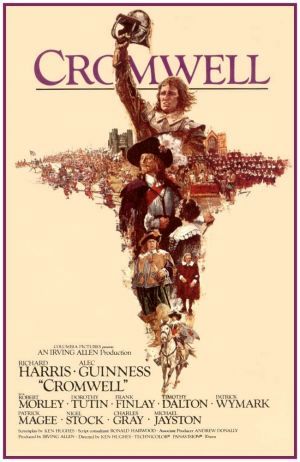
CROMWELL
UK, 1970,142 minutes, Colour.
Richard Harris, Alec Guinness, Dorothy Tutin, Robert Morley, Patrick Wymark, Nigel Stock, Patrick Magee, Frank Finlay, Timothy Dalton, Zena Walker, Michael Jayston, Geoffrey Keen, Charles Gray.
Directed by Ken Hughes,
Cromwell is a vivid historical film, beautifully costumed and photographed and giving a satisfactory impression of the times. On the level of accuracy, fair stating of issues, dialogue and characterisation, it is not as satisfactory.
Richard Harris portrays Cromwell as a husky hero of iron will, who undergoes crises at different stages of his life, leading ultimately to the execution of Charles I, a Divine Right monarch, and his eventual leadership of Britain. Alec Guinness is more successful at presenting Charles I physically and showing how complex was the character of a pious but proud Divine Right king. A supporting cast of some of Britain's leading actors have no difficulty in providing excellent characterisations.
Much of Cromwell's activities had to be omitted, but it seems a pity that there is no reference to his campaigns in Scotland and, especially Ireland and that the Parliamentary period after the death of Charles I had to be passed over so quickly. The finale in honour of Cromwell is too much for the film.
Despite these serious limitations, the film is certainly a visual success and very entertaining.
Cromwell and Charles I were the subject of To Kill a King with Rupert Everett as the king and Tim Roth as Cromwell.
1. What impression did Alec Guinness's portrayal of Charles I make on you and how did it influence your judgment on the issues of the film? Be was presented as an unswerving believer in divine right monarchy and acted accordingly, independent of the wishes of others, He was weak, pious, self-confident, an intriguer, gentleman, loving husband and father, saint and politician.
2. What impression did Richard Harris 's portrayal of Cromwell make on you and how did it influence your judgment on the issues of the film? He was presented as a devout Protestant, English, religious, socially-minded a believer in equality, an idealist, a military genius, ruthless, a politician, strong-willed, a family man, fearless and a man of power.
3. Comment on Cromwell's change of attitudes during the film - a crisis accompanied by suffering or death - e.g., ears cut off, old Will's death, his son's death, hanging.
4. Did Cromwell have a just cause? Note the sequence about enclosure -and the intervention of the Duke of Manchester, the lack of Parliament for 11 years, the king's persecutions and intrigues, wars?
5. Check the historical accuracy of the presentation of the minor characters e.g., Stafford, Hyde, Manchester, Rupert. The film is wrong about Hyde and misleading about Rupert.
6. What was Henrietta Maria's influence on Charles I - French, Catholic, believer in divine rights, ambitious for her son Charles, intriguing with the Papal Legate?
7. How well done were the battle scenes? Why did Cromwell eventually win?
8. What important aspects of Cromwell's life have been omitted - e.g. Ireland and Scotland and the Rump Parliament? Does this affect the film?
9. Why was the execution of Charles I so unthinkable in 1649?
10. The film concludes with a glorification of Cromwell. Did he deserve this?
11. Was the film a successful historical film - the events and moods of the times? How socially-minded and how religiously-motivated were the events of the times?